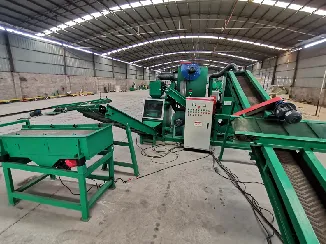

Sep . 17, 2024 02:10 Back to list
The Importance of Solid Waste Recycling Plants
In today's world, the management of solid waste has become an increasingly pressing issue. With populations growing and urban areas expanding, the amount of waste generated daily continues to rise, posing significant environmental challenges. Solid waste recycling plants play a critical role in addressing these challenges by transforming waste into valuable resources while also promoting sustainability.
Solid waste recycling plants are facilities designed to process various types of waste materials, including plastics, metals, paper, and organic matter. The primary goal of these plants is to recover as much material as possible, thereby reducing the volume of waste that ends up in landfills. The recycling process typically involves collection, sorting, processing, and manufacturing new products from recycled materials.
One of the key benefits of solid waste recycling plants is their contribution to resource conservation. By recycling materials, we can significantly reduce the need for virgin resources, such as timber, minerals, and fossil fuels. This not only helps to preserve our natural resources but also minimizes the energy consumption and emissions associated with producing new materials. For instance, recycling aluminum saves up to 95% of the energy required to create new aluminum from raw ore.

Moreover, these plants play a vital role in reducing environmental pollution. Landfills are notorious for emitting greenhouse gases and leachate, which can contaminate soil and water sources. By diverting waste from landfills and repurposing it into new products, recycling plants help mitigate these harmful effects. Additionally, the reduction of waste in landfills extends their lifespan, allowing for more sustainable land management practices.
The economic benefits of solid waste recycling plants should not be overlooked. The recycling industry creates numerous jobs, from collection and sorting to processing and manufacturing. In addition, recycled materials often have a lower cost than new materials, offering financial incentives for manufacturers to incorporate recycled products into their production processes. This can lead to a more circular economy, where materials are continuously reused and repurposed.
Public awareness and participation are also crucial components of the success of solid waste recycling plants. Communities that actively engage in recycling programs contribute to the effectiveness of these facilities. Educational campaigns highlighting the importance of recycling and proper waste separation can encourage individuals to take action, ultimately increasing the quality and quantity of materials sent to recycling plants.
In conclusion, solid waste recycling plants are instrumental in managing waste sustainably. They conserve resources, reduce pollution, and provide economic opportunities. As society continues to grapple with the challenges of waste management, enhancing and supporting recycling efforts will be vital for creating a cleaner, healthier environment for future generations. We must all play our part in this collective effort to promote recycling and sustainability.
Latest news
Troubleshooting Common Eddy Separator Problems
NewsJul.04,2025
The Role of Metal Recycling Plants in Circular Economy
NewsJul.04,2025
The Impact of Recycling Line Pickers on Waste Management Costs
NewsJul.04,2025
Safety Features Every Metal Shredder Should Have
NewsJul.04,2025
How Industrial Shredders Improve Waste Management Systems
NewsJul.04,2025
How Cable Granulators Contribute to Sustainable Recycling
NewsJul.04,2025